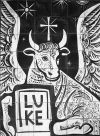
The Gospel of Luke
Jesus and the Centurion: Lk 7,1-10
Luke frequently pairs men and women in his Gospel. We have seen Simeon (2,25) followed by Anna (2,26) at the Presentation in the Temple. The other example I gave was the parables of the lost sheep and the lost coin (15,1-10).
The key phrase of the account in John's Gospel is "unless you see signs and wonders, you will not believe" (Jn 4,48). Faith and believing is key to this incident in all three Gospels.
In Luke's account, 7,3-5 are unique. The centurion sends messengers to Jesus, first the elders (7,3-5) and then his friends (7,6).
Therefore in Luke's version the centurion never meets Jesus as he does in both Matthew and John. As John's Gospel puts it with Jesus' words to Thomas, "Blessed are those who have not seen and yet believe" (Jn 20,29). In a way, we can see members of Luke's own community being invited to identify with the centurion.
Now return to the main page to continue with the reading.
Looking to the Old Testament background, the Syrian General Naaman who seeks healing in 2 Kings 5,1-14 receives a number of instructions from the prophet at second hand. Notable as well is the Jewish girl (2 K 5,3) who makes the suggestion that Naaman goes to the prophet Elisha for healing.
More important is the way this story in Luke's Gospel looks forward to and prepares for the conversion of another centurion, Cornelius. This is told in chapter 10 of Acts where centurion provides a model for the believing Gentiles. Both centurions are God fearing and have respect for Judaism (7,5; Acts 10,2.22). The Gospel centurion never meets Jesus, just as Cornelius also becomes an example of one who has faith without seeing him. John 20,29 makes just this point.
Before we take this further, I mentioned the centurion's attitude towards his slave. Slavery was an essential part of the Roman Empire. Some were slaves in dire conditions, working in the mines or as a gladiators until they died. Many others would have been like this centurion's slave. They would have been trusted servants and so highly prized and valued and could look forward to receiving their freedom.
The first group of messengers, the elders of the synagogue, stress the centurion's worthiness. That would be the outer image of the man. The second group, his friends, stress his inner attitude, his unworthiness (7,7) and his absolute trust in the authority of Jesus (7,8). This trust comes from what he has heard about Jesus.
Jesus therefore is able to respond by praising the man for his faith (7,9) whereas the elders in their recommendation had praised only his good works (7,5).
Verse 10 then speaks not of the centurion (Mt 7,13) but rather of those whom he had sent. They duly find the slave in good health.
Now return to the main page.
The Sunday Gospel
The Old Testament reading for this Sunday taken from chapter 8 of the first book of Kings comes from Solomon's prayer at the dedication of the Temple. The phrase that echoes through this prayer is "listen in heaven" as Solomon prays for all possible circumstances. This includes an openness to foreigners, those who have heard of God's great name (1 Kings 8,42). The God of Israel is not a God who is exclusive to Israel (verse 43).
Luke's account of the centurion may have been chosen as a Sunday Gospel because the centurion sends two groups of messengers to act on his behalf. Matthew as we have seen has the more typical direct encounter between Jesus and the Centurion.
Back now to the main page as we continue and read about the widow.
